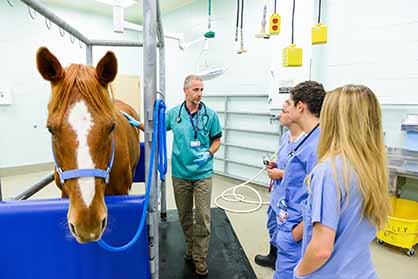UC Davis Researchers Tackle the Mysterious Coronavirus
UC Davis School of Veterinary Medicine
While there is still much to be known about equine coronavirus (ECoV), researchers at UC Davis are discovering many commonalities among horses infected with the disease and are hopeful to someday find the root cause. Their research is helping veterinarians better diagnose and treat the disease, as well as helping horse owners manage or even prevent an outbreak.
The origin of ECoV still remains a mystery – some suspect it may have developed from bovine coronavirus and spread across species. What is known about the spread of ECoV among horses is that respiratory shedding of the disease is unlikely. ECoV is mostly spread feco-orally, according to Dr. Nicola Pusterla, meaning it can be passed from horse-to-horse via exposure to contaminated feces.
Dr. Pusterla recently gathered all of the clinical equine veterinarians at UC Davis to update them on the disease, as recent outbreaks have brought patients to the hospital. His presentation covered a research project into the disease and reviewed several case studies to better prepare the clinicians for ECoV cases that may arrive at their Large Animal Clinic. The UC Davis veterinary hospital is uniquely qualified to diagnose and treat ECoV cases, with its multiple board-certified equine infectious disease specialists and a highly trained technical staff experienced with treating the disease. The facilities include an isolation unit to treat the horses without infecting other hospitalized animals, as well as an on-site laboratory to immediately perform diagnostic tests to confirm the disease and develop an appropriate treatment plan.
The school’s research showed that most horses with ECoV will present as anorexic (98%) and lethargic (88%), with an elevated rectal temperature (≥ 101.5°F; 81%). Less common signs may include diarrhea (23%), colic (16%), and neurologic deficits (4%) such as aimless wondering, headpressing, recumbency or seizures. However, veterinarians should not assume that symptomatic horses have ECoV and asymptomatic horses do not. PCR testing throughout this research confirmed that 10-20 percent of asymptomatic horses involved in outbreaks have detectable ECoV in their feces.
While ECoV was reported in foals more than two decades ago, ECoV in adult horses has only recently been recognized as a new infectious virus. Unfortunately, little research has been performed to better understand the virus and its disease. Dr. Pusterla and his team are continuing to discover more of this emerging disease’s traits.
Initially, ECoV was only associated with foals, but outbreaks around the world among adult horses confirm that the disease is not age specific. In 2011, a group of adult draft racing horses in Japan contracted the disease, and groups of adult horses at facilities in more than ten U.S. states were infected between 2011-14. Due to the increased awareness of ECoV infection in horses and the availability of testing modalities, outbreaks of ECoV continue to be reported across North America.
UC Davis works with many of these facilities to help contain the outbreaks and treat the animals by offering diagnostic support in exchange of clinical and biological information on the infected horses. This data helps researchers further their understanding of ECoV and gain valuable epidemiological information.
There is much good news for horse owners in this research. First and foremost, the mortality rate is low. Many horses may contract ECoV, but few will die from it. In a recent UC Davis study, only 8 percent of horses infected with ECoV died as a result of complications such as endotoxemia, sepsis or hyperammonemic encephalopathy. Furthermore, the infection is generally short-lived. Clinical signs only persist for one to four days and are cleared with general supportive care.
Dr. Pusterla encourages horse facilities to continuously enforce biosecurity protocols to stop the spread of ECoV and take extra precautions at events where large groups of horses converge.











